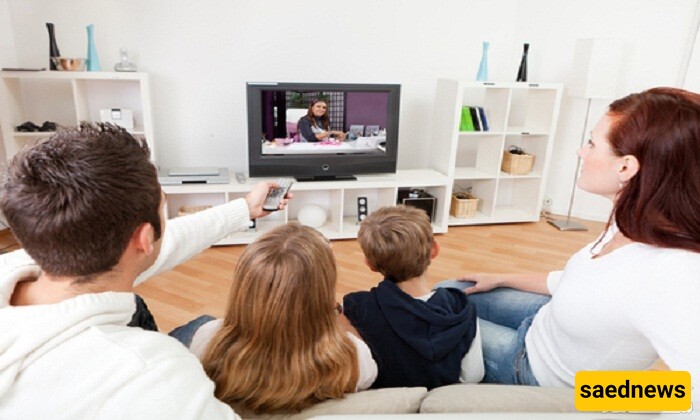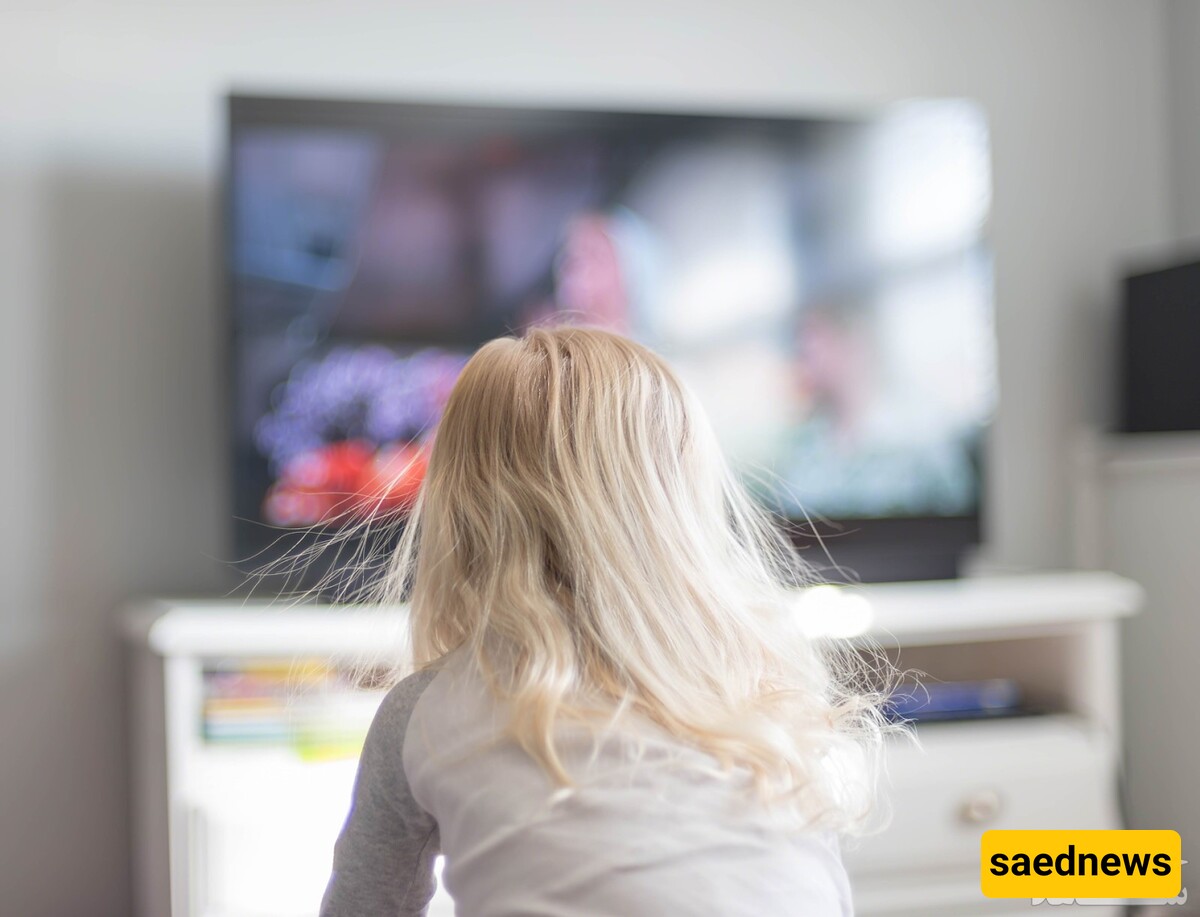The effects of television on children and its impact on child upbringing are among the most debated topics of our time. Avoiding television and not watching it as a child is a difficult task. However, it must be acknowledged that the effects of television—both positive and negative—are undeniable.

Television: The Invisible Member of Modern Families
Television is an invisible member of today's families. You have probably seen many people who seem unable to live without television. They turn it on as soon as they get home, even if they have tasks requiring concentration or are in a family or social gathering.
We live in a world where many parents struggle to find enough time to spend with their children. Busy parents often see television as a great way to keep their energetic children occupied. Likewise, children love spending time in front of the TV. They enjoy watching their favorite programs while eating, before bedtime, and as soon as they wake up.
Some parents claim that television is the root of all their child's behavioral problems, while others see it as a great friend and a valuable educational tool that enhances their child's understanding.

While there is a common belief that watching TV is harmful to children, research suggests that watching television, when done appropriately, can be beneficial in many ways. Here are some of these benefits:
TV can assist children in learning about various subjects. If your child has an interest in a specific academic or non-academic topic, there is likely a TV show, movie, or educational DVD that explains it in detail.
For example, if you watched the cartoon Tennessee Tuxedo and Chumley as a child, you probably enjoyed the lessons taught by Professor Whoopee in the form of problem-solving. Similarly, social skills are taught through puppet shows like Amoo Pourang’s Neighborhood or Red Hat and Cousin.
TV programs can also expand a child’s vocabulary. Some focus on wildlife and nature, while others emphasize good habits like healthy eating. Many cover academic subjects like science and history in an engaging and exciting way. The combination of visual and auditory content in children's programs encourages greater learning.
Most children do not have the opportunity to visit deserts, rainforests, or see giraffes in the wild, but they can experience these things through television. Educational producers create programs that allow children to watch fascinating films about nature, animals, societies, and different cultures. These shows can help both children and adults appreciate the world more.
Watching TV can also show children how kids in different parts of the world live, offering a fun learning experience that enhances their empathy.
Actors, musicians, and other TV personalities significantly impact how children dress, think, and behave. Allowing children to watch positive role models can guide them toward personal and social success. Parents can also use TV to teach kids critical thinking skills, helping them distinguish between good and bad role models.
Many children today are only children with no siblings or close playmates. Due to adults' busy schedules, they may only meet extended family once or twice a year. TV can be a valuable tool for socializing these children.
By watching TV, children can learn about different family roles (husband, wife, father, mother, sibling) and social roles (student, teacher, employer, employee, merchant, soldier, etc.). They also learn about public places like mosques, universities, hospitals, and police stations, helping develop their emotional intelligence and interpersonal skills.
Watching sports programs like football, wrestling, and volleyball can inspire children to participate in outdoor activities, promoting a healthy and active lifestyle. If parents highlight the benefits of exercise creatively, they can spark their child’s interest in physical activity.
Many movies and TV shows are based on books. Parents can encourage their children to read the book before watching the film. Sometimes, after watching a movie, kids may become interested in reading its book version. Discussing the differences between books and movies can also help develop their critical thinking skills.
From cooking and crafts to music and arts, various TV programs encourage creativity in children. These programs inspire kids to explore different activities and keep their minds open to trying new things.
In today’s fast-paced world, family gatherings have become rare. Fortunately, watching TV allows families to spend time together. They can watch a favorite program, relax, and later discuss it. By asking questions during a show, parents can make TV viewing a more interactive experience, improving children's cognitive skills like analysis, problem-solving, and prediction.

If your child is learning a new language or mimicking speech patterns, educational programs and films can help them understand vocabulary and sentence structures. Moreover, positive TV shows reinforce healthy emotional behaviors and teach children essential social skills.
While television can entertain and educate children, it can also have negative effects. Here are some of the disadvantages:
Children who spend excessive time watching TV may miss out on more productive activities like socializing with friends, doing homework, playing outside, or engaging in hobbies.
Kids who watch too much TV are at a higher risk of obesity and related health issues. If watching TV becomes an addictive habit, children may spend most of their day sitting in front of the screen, leading to decreased physical activity.
This mainly applies to children under the age of two. A baby’s brain undergoes critical development during this period, where social and emotional learning is essential. Unlike human interaction, television does not smile, talk, or engage with the child, which can negatively impact their mental development. Even later in life, excessive TV watching can limit a child’s social interactions.
When children watch too much TV instead of exploring the real world, their imagination may weaken. Since TV provides ready-made visual content, it prevents children from using their creativity.
Children who watch TV for more than 2-3 hours daily often struggle to concentrate in class. Such kids are also more likely to be diagnosed with ADHD (Attention Deficit Hyperactivity Disorder).
Children live in a joyful, simple, and imaginative world, and ideally, they should stay in this phase throughout childhood. However, watching adult-oriented TV programs can prematurely introduce them to information that pulls them out of this innocent phase. Disturbing news, violent images, or sexual content can all contribute to this issue.

Parents may not always be able to monitor what their children watch. Exposure to content featuring sex, alcohol, or drugs can raise confusing questions in a child's mind and distort their understanding of these topics.
One of the negative effects of TV is encouraging consumerism. Children see numerous advertisements that promote unnecessary products. Commercials often encourage unhealthy eating habits by advertising junk food, ice cream, and sugary drinks.
One of the most widely accepted effects of TV is its impact on academic performance. Children who watch too much TV may not allocate enough time for homework, leading to poor learning outcomes.
Long-term studies indicate that excessive TV watching can significantly affect a child's mental and emotional health. Children who spend more than three hours daily watching TV or playing video games are more likely to experience emotional and social difficulties.
Television has both positive and negative effects on children. While it can be a great educational tool, excessive or uncontrolled viewing can be harmful. Parents should carefully regulate what their children watch and encourage a balanced lifestyle that includes outdoor play, reading, and social interactions.

